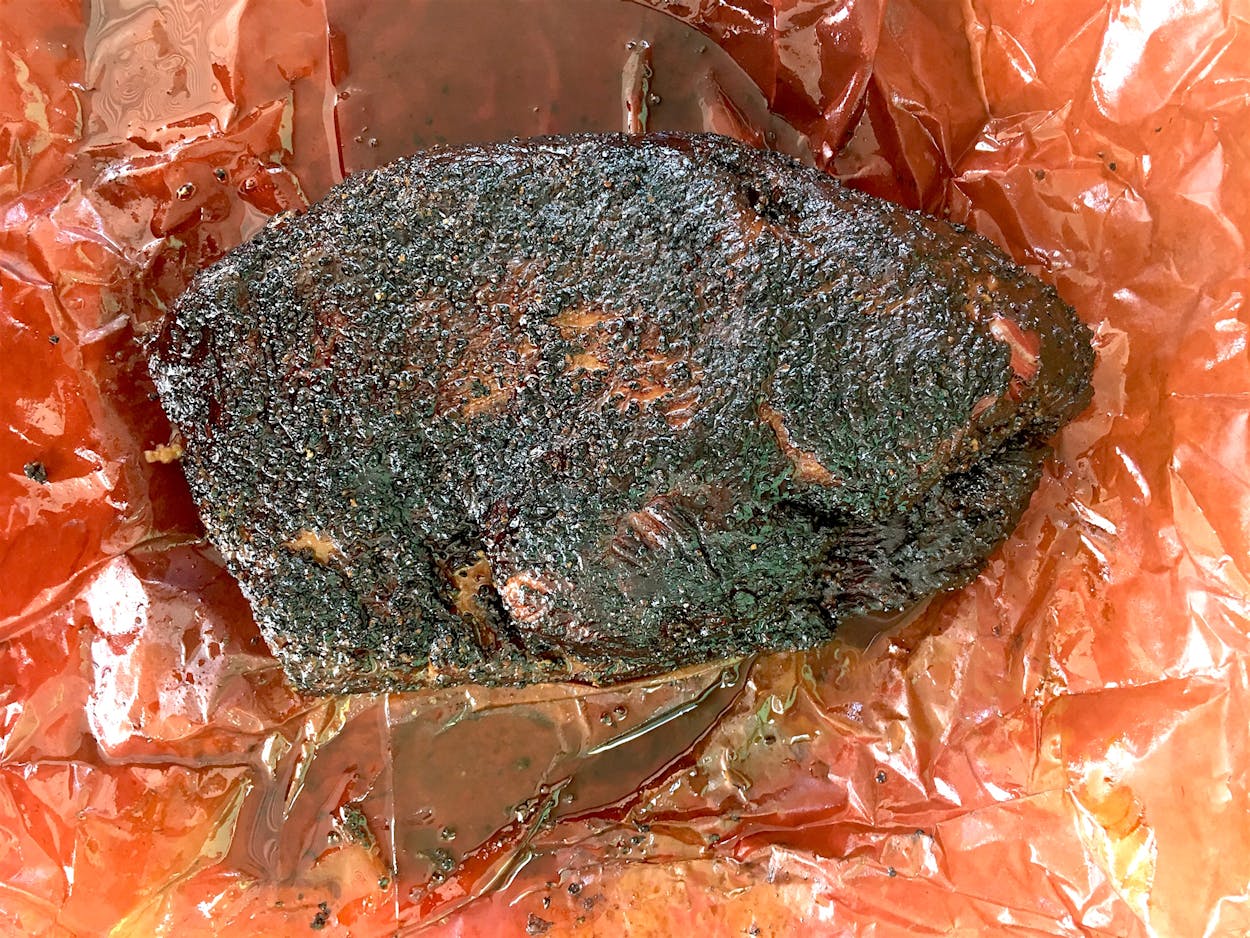The world’s most famous brisket cook doesn’t cook much brisket anymore. Aaron Franklin—who created one of the most recognizable names in barbecue from resuscitated trailer and a reclaimed smoker—now leaves the cooking responsibility to a kitchen staff seasoned in the Franklin method, or really a more perfect method honed by Braun Hughes, Ben Lambert, Matt VanOrden, and Inkle Sinclair, the talented cooks under Franklin’s tutelage. Last week, under the burned out shell of Franklin’s now-fireless pit room, this barbecue brain trust gathered to cook a trio of kosher briskets, the likes of which had never been attempted at Franklin.
The idea was hatched during a brisket competition in Brooklyn. Franklin and I were judges, and agreed with the five others on the panel to crown Sruli “Izzy” Eidelman the Brisket King of New York. His duo of smoked brisket and pastrami, both of them kosher, wowed the judges. He celebrated with his friend and fellow kosher barbecue cook, Ari White, who took 2016’s title. Eidelman felt especially proud that judges from Texas had crowned his barbecue, considering that he’s traveled the state with friends as he developed the menu for his restaurant, Izzy’s Smokehouse, in Brooklyn. It’s just that he’d never tasted Texas barbecue.
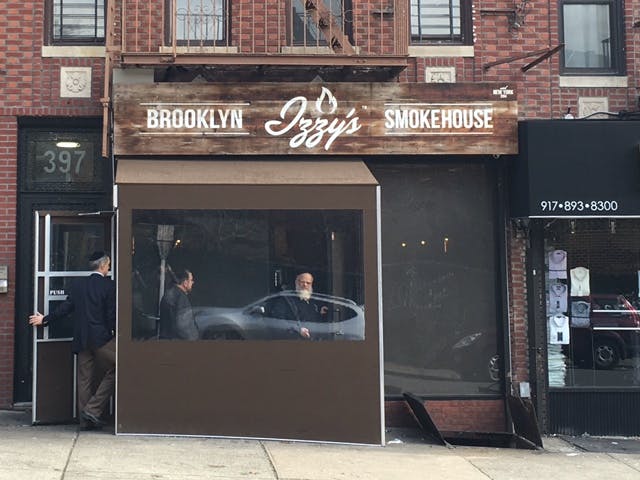
Eidelman is devoutly Jewish. Keeping a kosher diet is a fact of life for both he and Ari White. That’s not easy in the world of barbecue. Considering they represent the cutting edge of kosher barbecue, it’s hard for them to really know what they’re up against. Bubbe’s brisket might be a Passover tradition in many Jewish households, but it’s rarely smoked. White, who hails from El Paso, started a kosher barbecue catering company, Wandering Que, in New York, which is how Eidelman got his first bite of kosher brisket in 2013. He’s been hooked ever since, so much so that he opened Izzy’s Smokehouse in 2015 to create a kosher barbecue destination for his Crown Heights neighborhood.
The challenges of running a kosher restaurant begin with the meat. It’s expensive—kosher briskets can run $8 per pound instead of the relative bargain of around $4 per pound, which Franklin routinely pays. It’s especially taxing on the bottom line in a business that’s so meat dependent. Meat costs aside, the bigger hurdle is not having a great handle on the competition. For example, Eidelman counts Billy Durney of Brooklyn’s Hometown Bar-B-Que among his barbecue mentors. He’s heard how great their smoked brisket and beef ribs are, but since they’re not kosher, Eidelman can only inspect them. So when Durney brought Eidelman to Texas for a barbecue tour, he could only observe when they stopped in like places like Pecan Lodge. “It felt like showing up to the gates heaven but not being able to get in,” Eidelman says.
When I asked Eidelman what he would need for someone like Aaron Franklin to smoke a kosher brisket, his eyes lit up like a post-oak fire. “When can I buy a flight?” he immediately asks. We’d need a smoker that had never been used for treif, or non-kosher meat. A new one would be best, but an old pit could also be purged by fire. (As we cooked, Franklin joked that the fire, which had just destroyed his pit room, was an elaborate ruse to purge his hulking, steel smokers.) Coincidentally, Franklin was rolling the first of his backyard smokers out of his Bastrop welding shop. Proving himself to be quite the Texas barbecue mensch, Franklin agreed to keep one pristine so it could be used for kosher cooking. As the cook day approached earlier this month, Eidelman put three Kosher briskets (which were a steal at $6.50 per pound) on ice and flew with them to Austin.
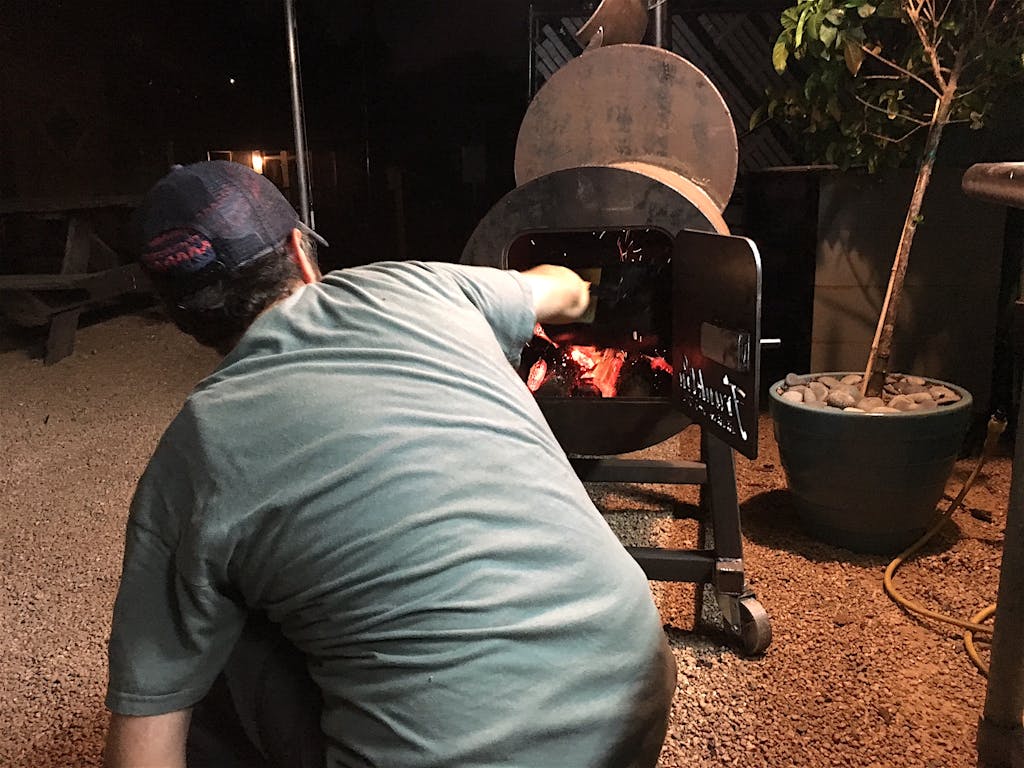
So there we were, ready to smoke a kosher brisket at 5 a.m. at Texas’s most famous barbecue joint, and nobody could find a lighter. A new steel smoker sat in the gravel between some picnic tables and Franklin’s dormant take-out trailer. A five-alarm fire had gutted the pit room ten days earlier, and supplies were understandably running low. I ran to my car for a book of matches, and brought it back for White to light the chimney full of charcoal. He emptied it into the firebox, and Franklin added a few chunks of post oak. They’d forgotten to install a thermometer, so Franklin drilled hole through the metal big enough to snake a probe thermometer through. By 6 a.m., the pit was at the target temperature of 275 degrees.
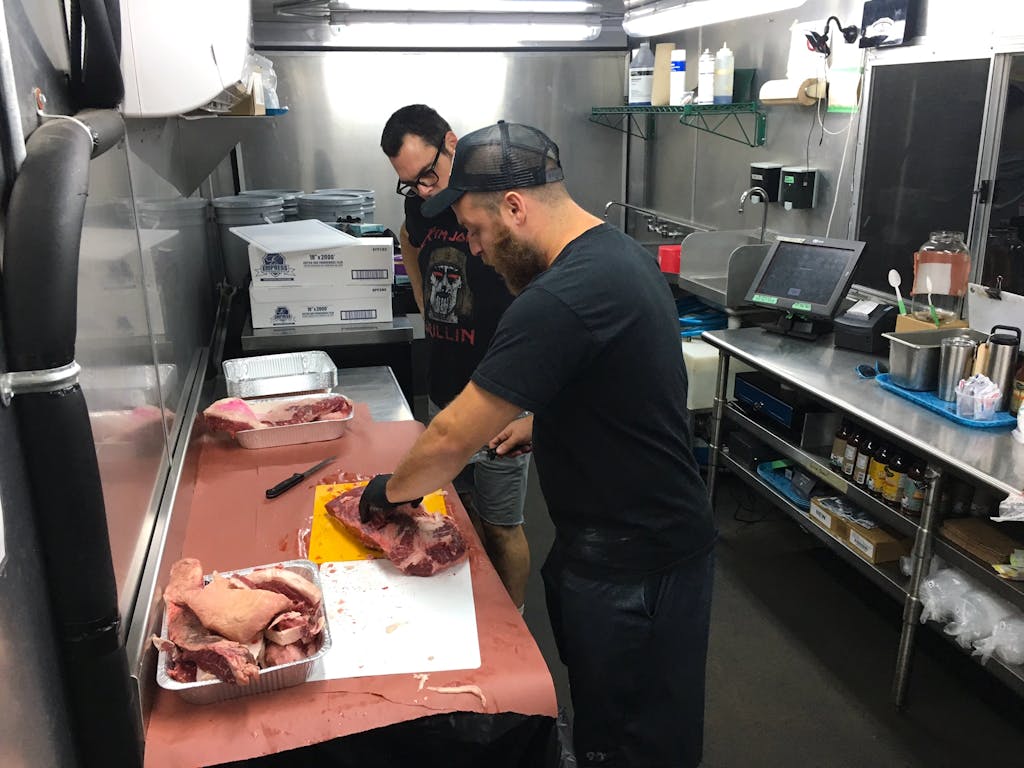
Meanwhile, Eidelman seasoned the briskets with salt and black pepper. He tried to hew as closely to the Franklin method as possible, but the standard equal parts of salt and pepper could have been disastrous for these particular cuts. As part of the kosher slaughter process, cuts of meat are salted to drive out any excess blood. This means they’re subjected to a light version of a dry-brine, so kosher briskets (and every other cut of meat) are inherently saltier. Eidelman sprinkled on a light layer of salt and a heavier layer of black pepper. Now, we were ready to cook.
The briskets went on at 6:05 a.m. A twelve-hour cook time was estimated, so we had some time to kill. Eidelman and White gushed about the kosher hot dogs they’d found at an H-E-B on the west side of Austin, dubbing that particular location “the heeb” for its kosher deli. They’d spent hours the previous day with Wayne Mueller feeding flood victims in La Grange. Louie Mueller Barbecue had donated a half ton of meat, and Eidelman and White sliced a good bit of it. But without any kosher food on the serving line, they sustained themselves through the day with pickle-flavored Pringles until they could get back to Austin. Those hot dogs were a G-dsend.
By noon, it felt like a whole day had passed. With anywhere from three to five people present to feed the fire at any one time, there was lots of sitting. The switch from coffee to beer was debated before noon, but we held off until about 1 p.m.
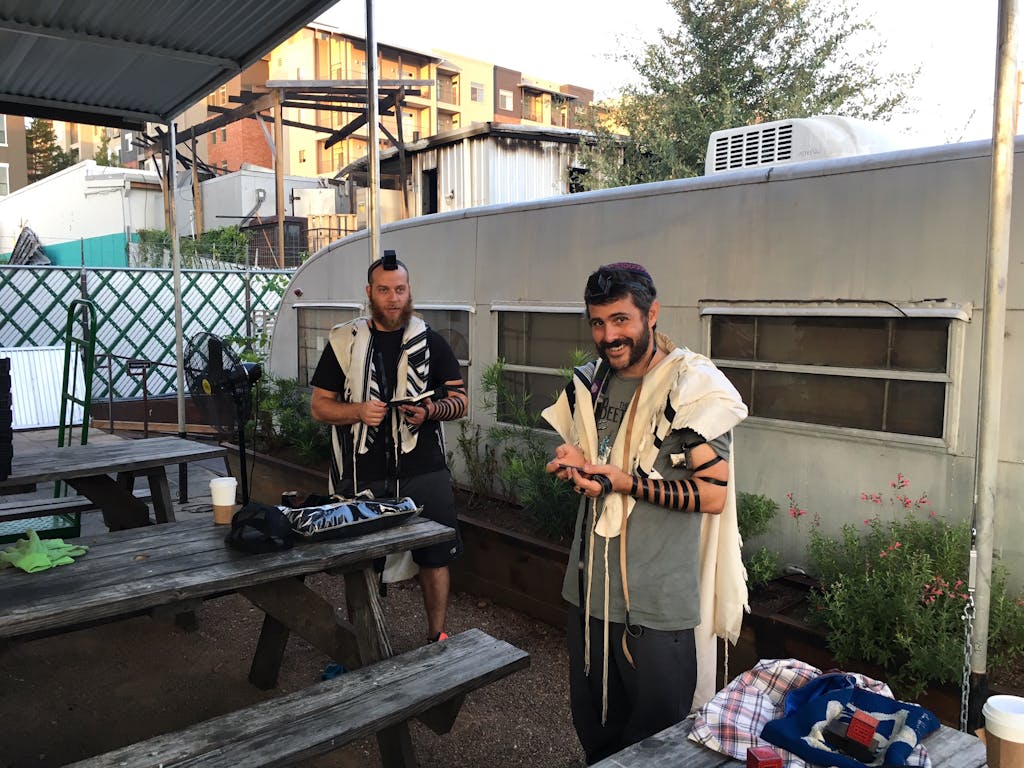
As the gentiles enjoyed pizza for lunch, White broke out a few links of his homemade kosher pepperoni. His company is gearing up for a retail presence in New York, and he had just produced 400 pounds of kosher sausages, destined for store shelves. It was going to fulfill his first big order, but he had a change of heart after Harvey. Despite the influx of donated food and aid to the region, White notes that, “For those people that do keep kosher, they can’t eat any of that stuff.” He loaded his first sausage shipment into a truck bound for a synagogue in Houston, but brought a few links with him to Austin. After an hour of post-oak smoke, they made for an excellent appetizer.
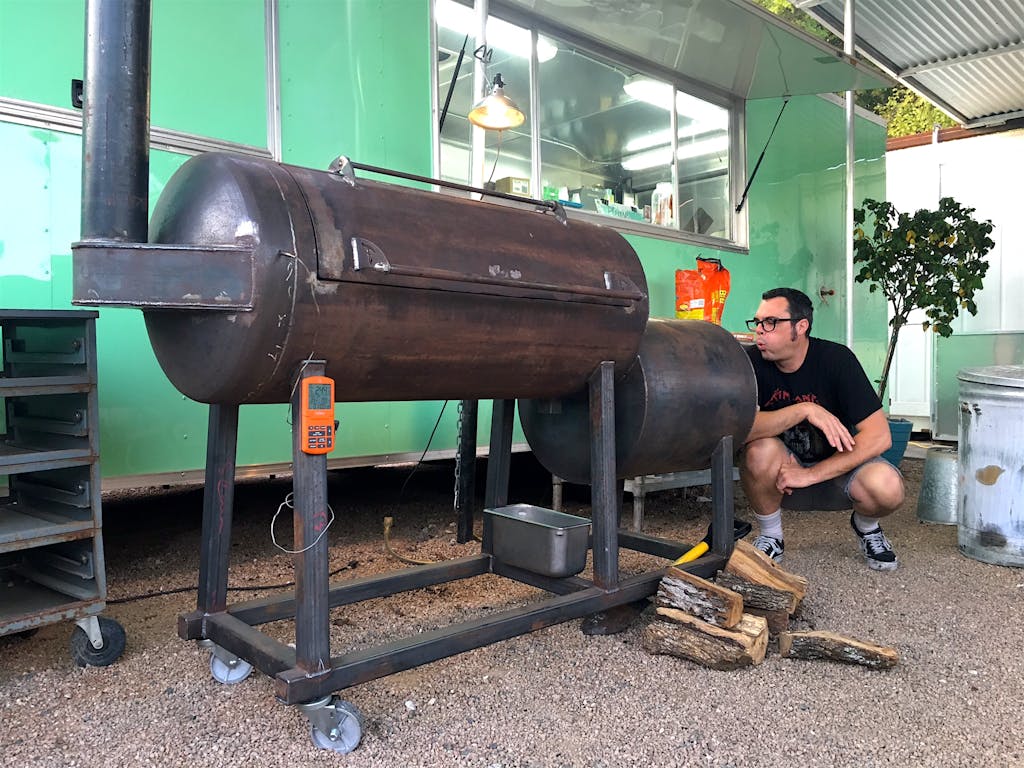
With a few hours still to go, Braun Hughes, the brisket whisperer of Franklin Barbecue, showed us how to wrap a brisket the Franklin way, with butcher paper. Hughes estimates that he’s cooked over 100,000 briskets at Franklin Barbecue, but these three were his first kosher ones. He demonstrated how to look for doneness, and explained why it makes sense to crank the heat to 300 degrees once the briskets have been wrapped. (The man should really put out his own YouTube videos.)
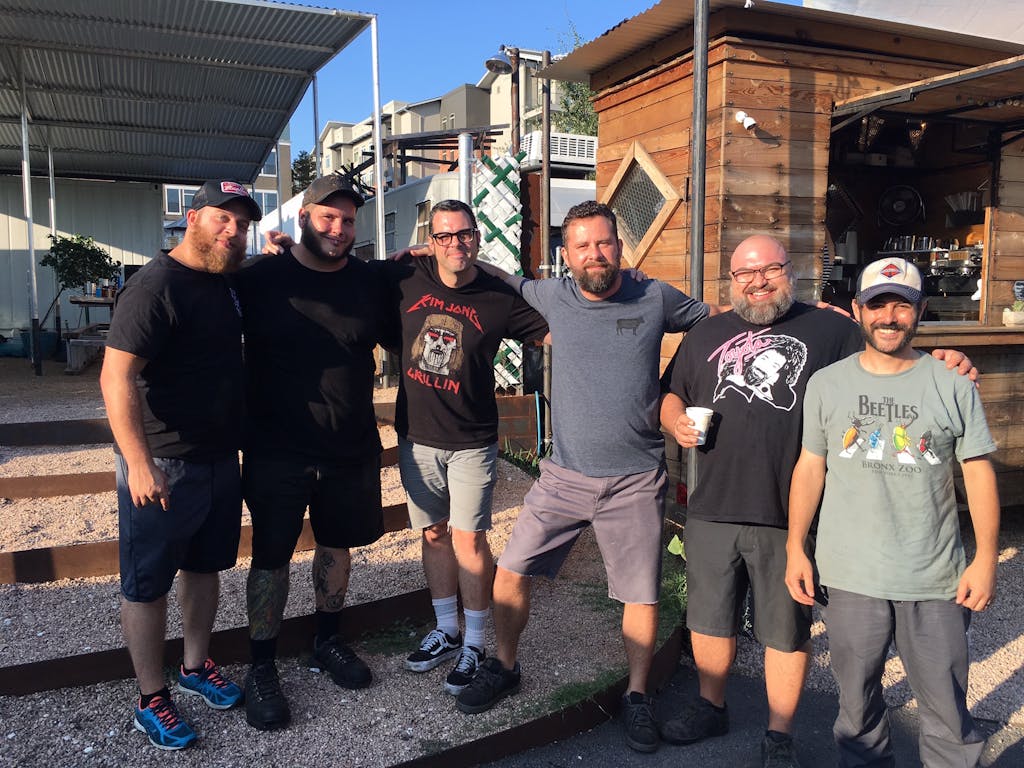
As we sat patiently, I asked Eidelman if he was excited or nervous for the outcome. The first bite of real Texas brisket can be discouraging for a budding New York brisket cook, let alone when their first bite comes from Franklin Barbecue. “I’m hoping it’s better than mine so it can push me to get better,” he says. Izzy’s Smokehouse is planning a move to a larger venue next year, and he wants the barbecue to improve along with it. “Besides,” he adds, “if you think you’ve nailed it, you’re just fooling yourself.”
The anticipation built as we took the briskets off the smoker. One key to Franklin’s brisket is the long rest time the briskets get after cooking, which gave us time to gather up the rest of our utensils. The kosher process doesn’t end with the cook. Eidelman unwrapped a cutting board he’d bought that morning. Franklin brought out a new slicing knife and serving tray. When a thermometer was needed to gauge the progress of the resting period, Franklin unwrapped a new Thermapen. Just like you don’t want to ruin a brisket at the very end with bad slicing, you don’t want to turn a perfectly good smoked kosher brisket into treif by using the wrong equipment to slice and serve it.
Franklin sliced the first brisket as White and Eidelman looked on. They were hesitant to pick up a slice, almost forgetting the whole point of the day was that they could eat. Each of them had closed eyes and broad smiles at the first bite, the kind that need no explanation. I assured them that this was the true Franklin flavor. The smell, the texture, and the beefiness were all there, but it did need a little extra salt. White asked for a moment of silence. “I’m having a moment,” he says with a laugh.
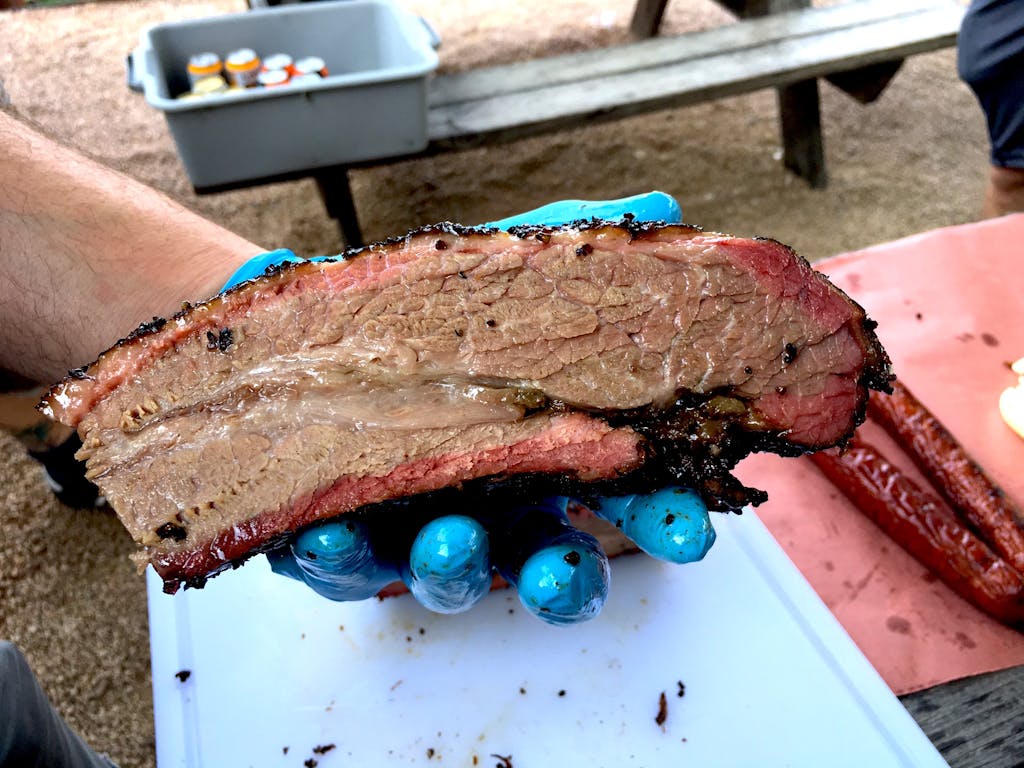
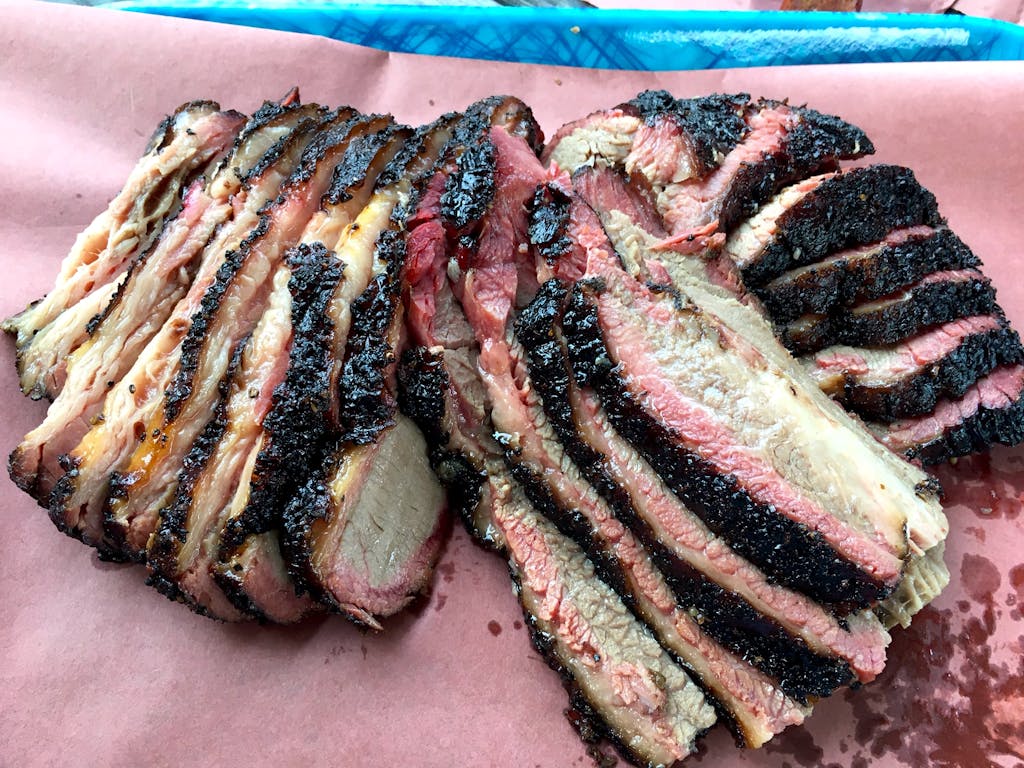
After a dozen bites, Eidelman described the flavor. “There’s some sweetness from the post oak,” he says, noting that the smoke flavor was more present than in his briskets back home. As for what he learned, Eidelman said the biggest lessons came in the details. From trimming the brisket, to the constant fire adjustments, a great brisket requires care and diligence. Just as things were getting a little too deep, Eidelman acknowledged his good fortune. “I went to Franklin and didn’t have to wait in line. I did have to wait twelve hours for the brisket, but I’ll take it.”
Eidelman and White were thankful of Franklin’s generosity, and, with a reopening date still not scheduled, I was happy to be eating Franklin brisket again. It was a great scene to have witnessed; a moment of genuine cultural exchange. This also means I have a solid excuse to visit Izzy’s again to see how the day’s lessons are implemented.
As a restaurant that keeps kosher, Izzy’s Smokehouse is also halal-friendly. In Brooklyn, that means another kind of cultural exchange. “You see a Muslim couple next to a Jewish couple,” Eidelman proudly says, recalling a quote from Anthony Bourdain: “Barbecue may not be the road to world peace, but it’s a start.” With full bellies, we all nodded. Without missing a beat, White pointed to the recently purged smokers in the shell of a pit room and suggests to Franklin, “maybe you could reopen as kosher.”
- More About:
- Franklin Barbecue
- Aaron Franklin


